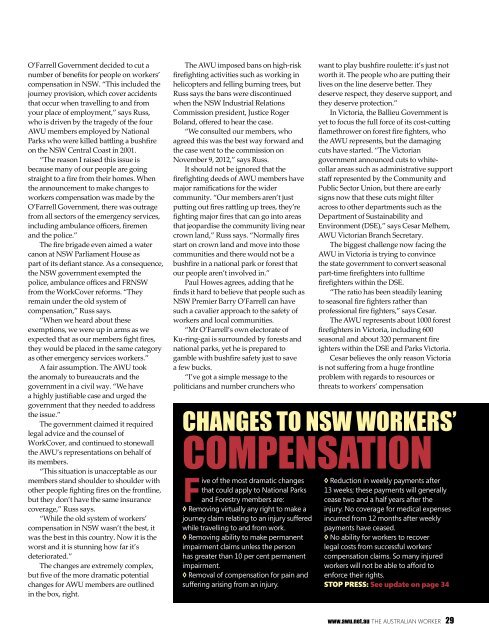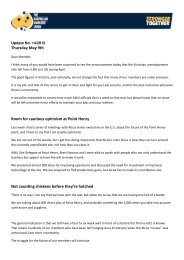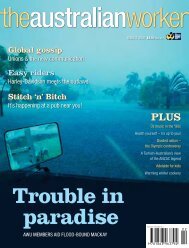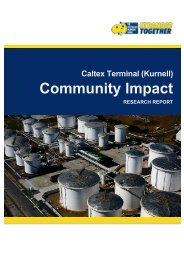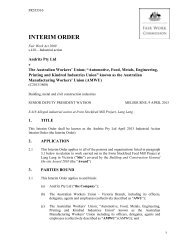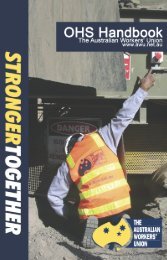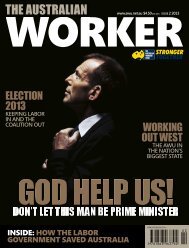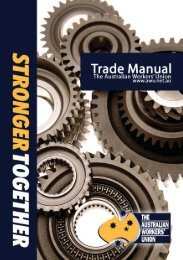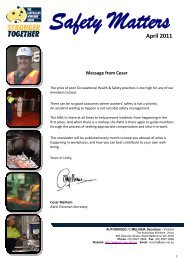Download PDF - The Australian Workers Union
Download PDF - The Australian Workers Union
Download PDF - The Australian Workers Union
Create successful ePaper yourself
Turn your PDF publications into a flip-book with our unique Google optimized e-Paper software.
O’Farrell Government decided to cut a<br />
number of beneÞts for people on workers’<br />
compensation in NSW. “This included the<br />
journey provision, which cover accidents<br />
that occur when travelling to and from<br />
your place of employment,” says Russ,<br />
who is driven by the tragedy of the four<br />
AWU members employed by National<br />
Parks who were killed ba"ling a bushÞre<br />
on the NSW Central Coast in 2001.<br />
“<strong>The</strong> reason I raised this issue is<br />
because many of our people are going<br />
straight to a Þre from their homes. When<br />
the announcement to make changes to<br />
workers compensation was made by the<br />
O’Farrell Government, there was outrage<br />
from all sectors of the emergency services,<br />
including ambulance officers, Þremen<br />
and the police.”<br />
<strong>The</strong> Þre brigade even aimed a water<br />
canon at NSW Parliament House as<br />
part of its deÞant stance. As a consequence,<br />
the NSW government exempted the<br />
police, ambulance offices and FRNSW<br />
from the WorkCover reforms. “<strong>The</strong>y<br />
remain under the old system of<br />
compensation,” Russ says.<br />
“When we heard about these<br />
exemptions, we were up in arms as we<br />
expected that as our members Þght Þres,<br />
they would be placed in the same category<br />
as other emergency services workers.”<br />
A fair assumption. <strong>The</strong> AWU took<br />
the anomaly to bureaucrats and the<br />
government in a civil way. “We have<br />
a highly justiÞable case and urged the<br />
government that they needed to address<br />
the issue.”<br />
<strong>The</strong> government claimed it required<br />
legal advice and the counsel of<br />
WorkCover, and continued to stonewall<br />
the AWU’s representations on behalf of<br />
its members.<br />
“This situation is unacceptable as our<br />
members stand shoulder to shoulder with<br />
other people Þghting Þres on the frontline,<br />
but they don’t have the same insurance<br />
coverage,” Russ says.<br />
“While the old system of workers’<br />
compensation in NSW wasn’t the best, it<br />
was the best in this country. Now it is the<br />
worst and it is stunning how far it’s<br />
deteriorated.”<br />
<strong>The</strong> changes are extremely complex,<br />
but Þve of the more dramatic potential<br />
changes for AWU members are outlined<br />
in the box, right.<br />
<strong>The</strong> AWU imposed bans on high-risk<br />
ÞreÞghting activities such as working in<br />
helicopters and felling burning trees, but<br />
Russ says the bans were discontinued<br />
when the NSW Industrial Relations<br />
Commission president, Justice Roger<br />
Boland, offered to hear the case.<br />
“We consulted our members, who<br />
agreed this was the best way forward and<br />
the case went to the commission on<br />
November 9, 2012,” says Russ.<br />
It should not be ignored that the<br />
ÞreÞghting deeds of AWU members have<br />
major ramiÞcations for the wider<br />
community. “Our members aren’t just<br />
pu"ing out Þres ra"ling up trees, they’re<br />
Þghting major Þres that can go into areas<br />
that jeopardise the community living near<br />
crown land,” Russ says. “Normally Þres<br />
start on crown land and move into those<br />
communities and there would not be a<br />
bushÞre in a national park or forest that<br />
our people aren’t involved in.”<br />
Paul Howes agrees, adding that he<br />
Þnds it hard to believe that people such as<br />
NSW Premier Barry O’Farrell can have<br />
such a cavalier approach to the safety of<br />
workers and local communities.<br />
“Mr O’Farrell’s own electorate of<br />
Ku-ring-gai is surrounded by forests and<br />
national parks, yet he is prepared to<br />
gamble with bushÞre safety just to save<br />
a few bucks.<br />
“I’ve got a simple message to the<br />
politicians and number crunchers who<br />
want to play bushÞre roule"e: it’s just not<br />
worth it. <strong>The</strong> people who are pu"ing their<br />
lives on the line deserve be"er. <strong>The</strong>y<br />
deserve respect, they deserve support, and<br />
they deserve protection.”<br />
In Victoria, the Ballieu Government is<br />
yet to focus the full force of its cost-cu"ing<br />
ßamethrower on forest Þre Þghters, who<br />
the AWU represents, but the damaging<br />
cuts have started. “<strong>The</strong> Victorian<br />
government announced cuts to whitecollar<br />
areas such as administrative support<br />
staff represented by the Community and<br />
Public Sector <strong>Union</strong>, but there are early<br />
signs now that these cuts might Þlter<br />
across to other departments such as the<br />
Department of Sustainability and<br />
Environment (DSE),” says Cesar Melhem,<br />
AWU Victorian Branch Secretary.<br />
<strong>The</strong> biggest challenge now facing the<br />
AWU in Victoria is trying to convince<br />
the state government to convert seasonal<br />
part-time ÞreÞghters into fulltime<br />
ÞreÞghters within the DSE.<br />
“<strong>The</strong> ratio has been steadily leaning<br />
to seasonal Þre Þghters rather than<br />
professional Þre Þghters,” says Cesar.<br />
<strong>The</strong> AWU represents about 1000 forest<br />
ÞreÞghters in Victoria, including 600<br />
seasonal and about 320 permanent Þre<br />
ighters within the DSE and Parks Victoria.<br />
Cesar believes the only reason Victoria<br />
is not suffering from a huge frontline<br />
problem with regards to resources or<br />
threats to workers’ compensation<br />
CHANGES TO NSW WORKERS’<br />
COMPENSATION<br />
Five of the most dramatic changes ◊ Reduction in weekly payments after<br />
that could apply to National Parks 13 weeks; these payments will generally<br />
and Forestry members are:<br />
cease two and a half years after the<br />
◊ Removing virtually any right to make a injury. No coverage for medical expenses<br />
journey claim relating to an injury suffered incurred from 12 months after weekly<br />
while travelling to and from work.<br />
payments have ceased.<br />
◊ Removing ability to make permanent ◊ No ability for workers to recover<br />
impairment claims unless the person legal costs from successful workers’<br />
has greater than 10 per cent permanent compensation claims. So many injured<br />
impairment.<br />
workers will not be able to afford to<br />
◊ Removal of compensation for pain and enforce their rights.<br />
suffering arising from an injury.<br />
STOP PRESS: See update on page 34<br />
www.awu.net.au THE AUSTRALIAN WORKER 29


